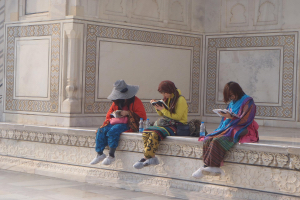
Commentary

By G Krishna Mohan Rao
New Delhi: The Bharatiya Janata Party (BJP) spokespersons’ ‘hateful and derogatory remarks on Prophet Mohammad’, have badly hit the country’s image both domestically and internationally. Despite the BJP government’s regrets over the remarks and the sacking of the spokespersons, experts feel that enormous damage has been done to the Indian diplomacy abroad and immigrants in the Gulf.
Describing the damage as “ far-reaching”, many diplomats feel that India’s reputation as a diverse, pluralistic and secular nation has taken a beating for its brazen anti-Muslim rhetoric and actions. The world is now watching India closely and its aggressive right-wing politics. Even the United States Secretary of State Antony Blinken raised his voice when he referred to concerns over human rights in India in the recent past.
Also read: Why should India’s ruling party punish its spokespersons?
The 57-member Organisation of Islamic Cooperation, which sees itself as the collective voice of the Muslim world, too has slammed India and called upon United Nations to take necessary measures to address the “ practices targeting Muslims in India “. The entire West Asian countries were up in arms. But it was the small country Qatar which took the lead and virtually humiliated India when it suddenly cancelled its banquet on June 5, 2022, in honour of Vice President Venkaiah Naidu, who was on an official visit to Qatar.
The entire Arab world, besides Indonesia and Malaysia, summoned Indian Ambassadors and condemned the remarks. Even countries like Maldives and Egypt condemned it. In fact, the remarks sparked a Twitter trend in the Arab World calling for a boycott of Indian products. The Kuwait supermarket pulled out Indian goods off shelves.
New Delhi was shaken over the developments. The South Block swung into action and tried to do the damage control by disassociating from remarks made by party spokespersons— Nupur Sharma and Navin Kumar Jindal—-describing them as “fringe “ elements.
When Opposition parties led by the Congress were shouting from rooftops over the ruling BJP ‘s “politics of majority communalism”, the BJP was silent. But this time it had to react when other nations protested, making the Congress leader Rahul Gandhi quip that “divided internally, India became weak externally. The BJP’s shameful bigotry has not only isolated us but also damaged Indian standing globally”.
The pressure was mounting on the BJP leadership over the sacking of spokespersons. The reality was that the matter could not be allowed to precipitate further as it could impact the livelihood of the Indians in the Gulf as also spoil the cordial relations India has with these countries. It was felt that as the chorus of Hindu majoritarianism continues to rise, suave diplomacy will not be able to cover up the rot.
The ties binding the Middle East with India are founded not only on history and culture but also on trade and commerce. Millions of Indians live and work in the Gulf. India’s business ties with these countries have only deepened over the years. India relies heavily on the region for oil. In other words, souring ties with the region can only hurt the national interest.
From the economic point of view, countries of West Asia, mostly Muslim by faith, may restrict Indian goods, as well as the Indian- origin workforce in these countries which may manifest in increasing restrictions in issuing working visas. It would also result in negating the investment India made in recent years to develop closer ties with Saudi Arabia and UAE.
Further, a cornerstone of Indian strategic outreach is the “ Act East Policy(AEP) which seeks closer economic, political and cultural ties with the ASEAN, where about 42% of the population is Muslim and only 18% Buddhist and 17% Christian. The possibility of a backlash against India due to the controversy is stronger than ever. Already, there is a legacy factor. in 2020, India had hit back with restricted palm oil imports from Muslim-majority Malaysia when its Prime Minister had banned India on the abrogation of article 370 and trifurcation of J & K besides criticising India’s Citizenship Amendment Act (CAA).
Photo: Foreign tourists at Taj Mahal. Image by ajkuiper89 from Pixabay




